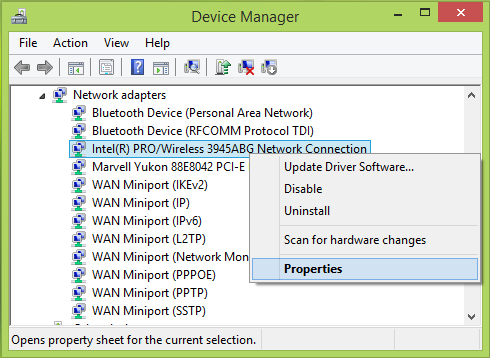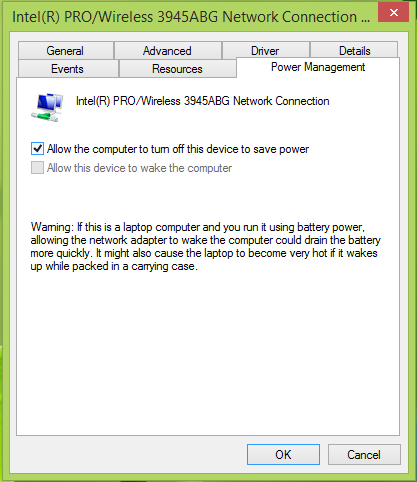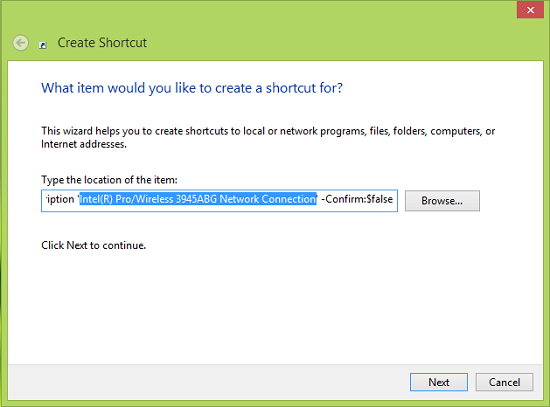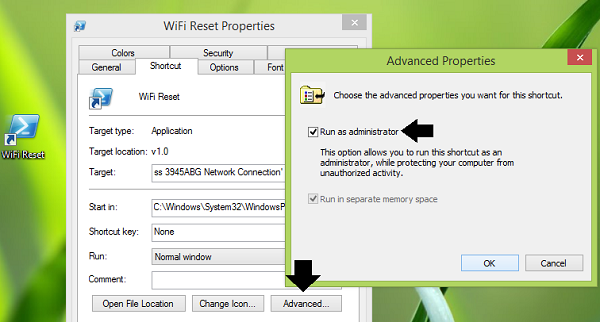We all use Wi-Fi on our Windows 11/10 computers to access the Internet. But many times, we run into different kinds of issues about the usage of Wi-Fi. We have already seen how to fix poor Wi-Fi performance, limited Wi-Fi networks, WLAN AutoConfig service not starting, etc. Today, we are sharing with you the way to fix the issue of Wi-Fi getting disconnected after you resume from Sleep mode. If you’re connected to a Wi-Fi network, and you move your system into sleep mode, after waking up, the system loses the Wi-Fi network connectivity.

In this scenario, after resuming from sleep, Windows would show that Wi-Fi connections are available, but it doesn’t automatically reconnect, or it doesn’t stay connected during sleep. This will affect your user experience if you rely upon background processes running on your PC, like downloading using Windows Store or Download Manager, etc. So if you’re getting frustrated with this problem, you can try these steps referenced from this wiki article:
Internet or Wi-Fi gets disconnected or does not automatically reconnect on Windows
There are two ways to fix this:
- Using Device Manager
- PowerShell Script
You will need admin permission to complete these steps
1] Using Device Manager
1. Press Windows Key + R and type devmgmt.msc in the Run dialog box to open Device Manager.

2. In the Device Manager window, expand Network Adapters and look for your Wi-Fi driver, do a right-click on it, select Properties.

3. In the property sheet, switch to the Power Management tab and uncheck the option. Allow the computer to turn off this device to save power. Click OK.

You may now close Device Manager and restart the machine to get your issue fixed.
Read: Fix Wi-Fi problems on Windows.
2] Using Windows PowerShell
1. Go to Desktop, right-click and select New -> Shortcut. In the Create Shortcut window, paste this command:
C:\Windows\System32\WindowsPowerShell\v1.0\powershell.exe restart-netadapter -InterfaceDescription '<WIRELESS ADAPTER NAME HERE>' -Confirm:$false
Substitute your system root drive with C: and wireless adapter name, which you can get from the Device Manager window shown previously in this article.
In our case, the wireless network adapter was Intel(R) Pro/Wireless 3945ABG Network Connection, so the command becomes:
C:\Windows\System32\WindowsPowerShell\v1.0\powershell.exe restart-netadapter -InterfaceDescription 'Intel(R) Pro/Wireless 3945ABG Network Connection' -Confirm:$false

Click Next.
2. Moving on, name this shortcut like Wi-Fi Reset and click Finish.

3. Finally, right-click the shortcut so created and select Properties. Click Advanced, and in the Advanced Properties window, check option Run as administrator. Click OK, then Apply, followed by OK.

You can pin this shortcut to Start Screen and double click as soon as you come around the issue. After double-clicking, let the system execute the command and reboot the machine. It should fix the problem.
Why does my computer keep disconnecting itself from the Wi-Fi?
There can be two reasons. The first is where the router is at fault. In this case, you need to create a new SSID and try connecting to it again from your Windows PC. The second is where the WIFI adaptor is at fault. In this case, you can uninstall the adaptor, let Windows find it again using the Scan for Hardware change menu, and let it install the driver again. If at all, you can choose to install the driver manually by downloading it from the OEM website.
How do I keep my Internet connection alive all the time?
If you have a desktop or laptop, disable the sleep mode. It is the primary reason why a PC keeps losing its internet connection. In the case of the laptop, you can disable the sleep action on the lid closed.
Can Wake-on-LAN work over Wi-Fi?
It works, but only if the Wireless device is sending the Wakeup call. So if one laptop is trying to wake up, it will work, but if a standard PC tries to wake it up, it will not work even if it’s on the same network.
I hope this helps!
Thanks was useful was looking for this
regards
Kanuj
http://www.candytech.in
Sooooooooooooooooooo helpful!!!! Thanks.
helped :) thanks a lot!
actually I stopped at first 3. but it works
I’ve used the power shell method to create the reset shortcut and it worked like a charm. Thank you for sharing this!
^^ Glad we could help :)
This didn’t help. Doesnt say that for me. Only WiFi Adapter
^^ Make sure you’ve tried all the steps exactly :)
very useful
mine doesn’t have an option for power management
Thanks for this nice article. Keep it up. :)
http://www.alquranonlinelearning.com
Worked fine for me …Thank you sooo much for sharing wonderful tips…:)
i tried this and it didn’t work. Then I rolled back the driver in device manager and that worked. the latest driver is corrupted.
Nice, thanks for help
^^ Glad it helped!
Amazing, thanks for this. I’ve been looking for a way to script a restart of the wifi adapter for ages but couldn’t find any info on how to do it.
Of course, it would be nice if Windows could successfully power the wifi adapter back on after sleep…
Why does it work after I restart my computer, but once the computer goes into sleep mode again I get no Internet access on my adapter bar and all my Internet programs stop working?
Worked perfectly on my new pc that is running Windows 10. Thanks
Mine has done it twice now. The first time I fixed it by disabling everything and then re-enabling everything then restarting. The second time that tactic didn’t work. The icon that shows up is saying no connections are available. Both times this occurred when coming out of sleep mode.
I have an ASUS Netbook and am encountering this problem. However, there is no Power Management option to disable under the Broadcom 80.11abgn Wireless SDIO Adapter…any ideas on how I could fix this…I couldn’t even reconnect o the WIFI after the computer goes to sleep w/o restarting
thank you! I used the device manager steps and it worked; am surprised that the default is to cut off your wifi
I use a Thinkpad Yoga and not sure I could get this to work. Whenever I take my personal computer to work, when I boot it up, I have to login to the guest network. Anytime I close the lid on my laptop though, when I open it back, I have to relogin into the guest network. I tried unchecking the Allow the computer to turn off this device to save power to my Intel (R) Dual Band Wireless AC 7260 #2, but it still has this problem.
Thank you so much! The Device Manager method worked for me! :)
…It worked like a charm …
My Surface Pro 4 also has “the sleep and wakeup WiFi disconnection problem”. I don’t know it will solve my problem for good yet. But still you seem a genius to me anyway. Thanks a lot.
Thanks a Lot. This really solved the problem for me. I have a Lenovo G50 Laptop Which was repeatedly facing same issue as described.
It would be nice if Microsoft just fixed the bloody problem. I can’t believe every version since XP they make so many simple steps twice as hard with every new version. I use hibernate all the time but I can’t use hibernate with Windows 10 as whenever I come out of hibernate I can no longer connect to a wireless network. And of course they dump the wireless manager from W7 with W8, then dumbed down even more in 8.1, now in 10 the only option is to open a command prompt! WTF! So now after resuming from hibernate I have to restart anyway…
Well done Microsoft. I’ve been a MS partner for over 15 years. Seriously considering looking at Linux.
I bought a new windows phone this year. It runs on windows 10. I’m quite amazed (or shocked) to read so many old threads on te internet on this subject, and the bug isn’t fixed in the newer devices. This tip here also doesn’t adres how to solve this problem within the phones version of windows 10. Can anybody help? I’m restarting my phone almost constant in order to reconnect to my wifi.
Thanks for the effort. But I will use my Mac until Microsoft provides a fix.
Great job. Since I had the exact setup your instructions worked to the letter,
thanks for sharing!!!!! i thought i was the only one with this issue. had known about the power mgmt. change, but not the short cut idea. have implemented and will try. i am curious if sleep mode corrupts the network adapter driver? a MORE IMPORTANT question for kapil and others is if you push the fn + f2 buttons (function + network button) does your wifi turn off? NOW do it again. will it turn your wifi back on and connect????? it should mine does it once, but on the second cycle it does not connect. i get the same result as when i come out of sleep.
This fix does not work in windows 10, at least my windows 10 as there is no network connection properties available in the device manager, all I have to choose from in device manager is the actual wireless device itself which is a realtek rtl8732bs and even clicking on that that there is no power management tab available.
While in Device Manager double click on the wireless device, followed by LEFT click on Power Management. Finally, remove the check mark from “Allow the computer to turn off this device to save power.”
Thanks for trying to help, but a little more detail would be most helpful. There is no “Power Managerment” to click on for this device, nor in “Device Manager” on this Asus Transformer. Any way you could be contacted to provide more detail? Or perhaps screen shots?
This article may be 2 years old, but it still helped me. Was having this problem every time my computer went to sleep. Using Trendnet USB 3.0 wifi adapter on Windows 10. Your solution still works. Thank you. <3
We update posts from time to time. :)
Worked after Step 3. Thanks!
It’s a tab in the wireless device properties. Double-click on the wifi adapter in Device Manager. The Properties page appears. There will be General, Advanced, Detail and Driver tabs at the top of the Properties page, at the very least. If you can’t see the Power tab, then perhaps you should look for the manufacturer driver – should be on the ASUS site – rather than the Microsoft one, if that’s what it’s using.
As for screenshots, look at the ones in the article. The 4th one down shows the tab in question. This is how it looks on any Windows machine. If you’re not seeing it at all, then maybe the device doesn’t do power management or you’re not logged on with an account that has Administrative rights.
Leaving your Wi-fi adapter ON all the time might make a computer a little easier to wake but is not really a solution. I suggest updating your wirless network adapter DRIVER first.
* To open Device Manager, press Windows Key + R at the same time, then type “devmgmt.msc”
* Click the + sign beside Network Adapters to display all adapters
and double-click your wireless adapter/connector (Intel, Broadcom, etc.) You can also look for a driver update on the manufacturer’s website (both computer and wireless adapter)
* In the device window, select the Driver tab, then “Update driver”.
* Reboot and test
I also have the same problem and the same modem. Painful and no solution available.
Thank you for the time you invested in sharing this with the public! Very much appreciated!
Many people always faces these kind of issues. But here Mr. Kapil have done a good job by mentioning the solution of wifi gets disconnected after sleep.
My adapter didnt have the “Power Management” tab and I am hoping the powershell command works.
A bigger thanks to Microsoft- issues like this, that require solutions like these, is why I switched to Mac. For this particular issue on Windows 10, if I left my computer and came back for 30 minutes or so, and tried to save a file to the network I’d need to RESTART MY COMPUTER and lose the work (because I didn’t want to save locally and upload to the network and break links). I’ll be switching to Mac at work also to prevent issues like this as MS continues to forray into exciting new features like this that continue to break simple things.
That power shell command worked like a freaking charm! Kinda sucks that there’s no known way to fix the source of the problem, but at least we have a working remedy that is painless once set up. Many thanks!
did you ever figure out how to fix this?
Did u find the solution for this?, happening the same to me…
This doesn’t work. I’ve had the power management setting changed for months and it still refuses to stay connected in hibernate/sleep mode
The problem was resolved when I check the “Allow the computer to turn off this device to save power” option. When unchecked, the Wi-Fi turns off when in sleep
Windows 10 Home
Mine is turned off but still windows says “not connected – no connections available”. I have compared driver and settings from my colleague who has exactly same laptop. Windows take forever to startup which is the only way to restore connection for me. I have all startup items disabled.